15 Best Buyer Intent Data Providers In 2026
Buyer intent data is a game-changer for B2B sales and marketing. It tracks online behaviors like search activity, content consumption, and website visits to identify prospects already showing interest in specific products or services. This helps businesses focus on high-conversion opportunities and create personalized campaigns.
In 2026, the top 15 providers stand out based on key factors:
- Data Accuracy: How precise and reliable their intent signals are.
- Integration: How easily they connect with tools like CRMs and marketing platforms.
- Pricing Transparency: How clear and predictable their pricing models are.
- AI Features: Use of machine learning for lead scoring and predictive insights.
- Business Fit: Suitability for startups, mid-sized companies, or large enterprises.
Here’s a quick overview of the top providers:
- Leadsforge: Affordable, AI-powered lead lists with flexible pricing.
- Salespanel: Real-time website visitor tracking and intent identification.
- 6sense: Account-based marketing platform with predictive analytics.
- ZoomInfo: Extensive B2B database paired with intent signals.
- Bombora: Tracks company-level content consumption surges.
- Cognism: GDPR-compliant data with verified contact details.
- Demandbase: Combines intent data with account intelligence for ABM.
- Lead Forensics: Identifies anonymous website visitors.
- G2 Buyer Intent: Focused on software purchasing signals.
- TechTarget Priority Engine: IT-focused intent data and buying group insights.
- Lusha: Quick contact enrichment with intent signals.
- Lead Onion: Technographic and firmographic insights.
- Artisan: AI-driven sales assistant for automated outreach.
- DealSignal: High-quality, verified B2B data with intent scoring.
- UserGems: Tracks job changes for relationship-based sales.
Each provider offers unique strengths, so choosing the right one depends on your business size, budget, and tools. Below is a quick comparison to help you decide.
Quick Comparison
| Provider | Data Type | Best For | Pricing Transparency |
|---|---|---|---|
| Leadsforge | AI-driven lead generation | Small to mid-size teams | High |
| Salespanel | Website visitor tracking | Nurturing website visitors | Medium |
| 6sense | Predictive analytics | Large enterprises with ABM strategies | Low |
| ZoomInfo | Contact database + intent | Sales teams needing extensive data | Medium |
| Bombora | Company surge data | Demand generation | Low |
| Cognism | Verified global database | GDPR-compliant prospecting | Medium |
| Demandbase | Account intelligence | ABM programs | Low |
| Lead Forensics | Website visitor identification | B2B lead follow-up | Medium |
| G2 Buyer Intent | Software buying signals | SaaS and software companies | High |
| TechTarget | IT purchase intent | Tech vendors | Low |
| Lusha | Contact enrichment | Quick prospecting | High |
| Lead Onion | Technographic data | Targeting specific tech users | Medium |
| Artisan | AI-powered sales assistant | Automated outreach | Medium |
| DealSignal | Verified B2B data | Accurate lead generation | High |
| UserGems | Relationship intelligence | Relationship-based sales | High |
Focus on what aligns with your goals: precision, integrations, or pricing flexibility. Choose wisely to maximize your sales and marketing efforts in 2026.
1. Leadsforge
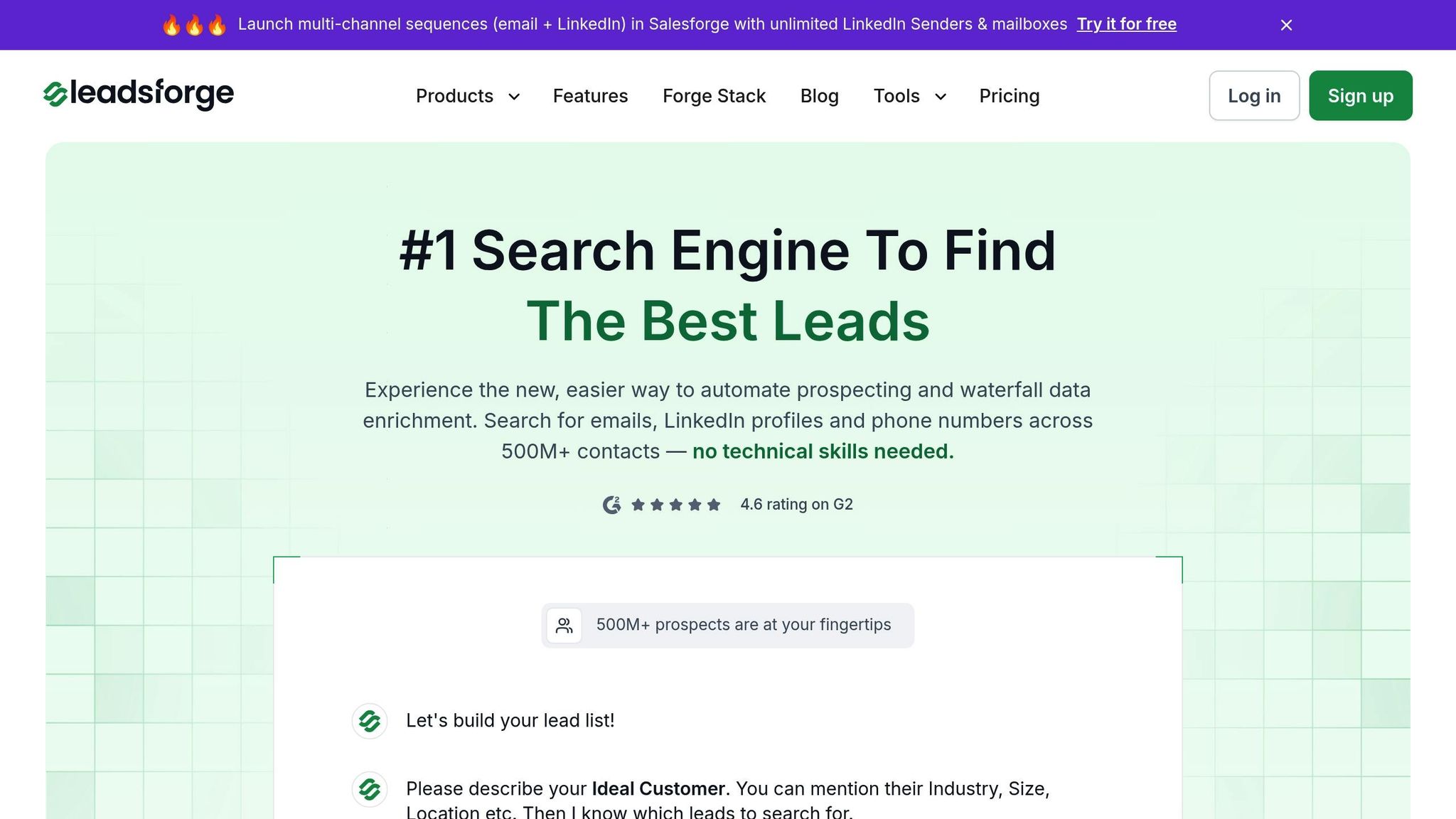
Leadsforge uses AI to simplify prospecting by providing highly targeted and verified lead lists. Instead of just offering raw intent signals, it focuses on delivering actionable data that sales teams can immediately use, making it accessible for businesses of all sizes.
The platform identifies prospects with buying intent through tools like company followers search and lookalike search functionality. These features help sales teams discover companies that behave like their best customers, expanding their reach to similar high-potential prospects. Every aspect of Leadsforge revolves around precision and relevance.
Data Accuracy
Leadsforge ensures its data is accurate and up-to-date through a multi-source, real-time verification process. By pulling information from various sources instead of relying on a single stream, it maintains a higher standard of data quality compared to many competitors.
Its lead qualification and intent signals feature works hand-in-hand with its AI engine to filter out irrelevant prospects. This means sales teams can focus on contacts and companies showing strong purchase intent, cutting through the noise of traditional lead databases and increasing the chances of conversion.
Integration Capabilities
Part of The Forge Stack ecosystem, Leadsforge seamlessly integrates with tools like Salesforge for multi-channel outreach, Mailforge for email infrastructure, and Warmforge for improving email deliverability. This interconnected setup creates an efficient workflow, from identifying leads to executing outreach campaigns.
Leadsforge also supports downloadable lead lists, making it compatible with most CRM systems and sales tools. While detailed integration options aren't heavily documented, the platform is designed to fit into existing sales processes without requiring major changes.
Pricing Transparency
Leadsforge offers straightforward and flexible pricing through a credit-based model that ensures cost predictability. New users get 100 free credits upon signing up, with additional credits available through referrals. The Essential Plan is priced at $49 per month (billed monthly) or $588 annually, providing 2,000 credits per month or 28,000 credits annually when paid upfront.
The platform’s credit system is flexible - credits never expire, allowing teams to use them as needed without worrying about hitting monthly limits. Additional credits can be purchased on demand, making it easy for growing teams to scale their efforts without committing to a higher-tier plan right away.
AI-Powered Features
Leadsforge simplifies prospecting with a conversational interface that lets users describe their ideal customer profile in plain language. Based on these descriptions, the AI generates targeted prospect lists.
The platform’s AI engine processes multiple data points at once, including LinkedIn profiles, email addresses, and phone numbers. This ensures contact details and company insights stay current, avoiding outdated information that could lower conversion rates. By continuously enriching data, Leadsforge helps sales teams maintain an edge in their outreach efforts.
<script>(function(d,u,ac){var s=d.createElement('script');s.type='text/javascript';s.src='https://a.omappapi.com/app/js/api.min.js';s.async=true;s.dataset.user=u;s.dataset.campaign=ac;d.getElementsByTagName('head')[0].appendChild(s);})(document,372145,'tlb9tturzitublbka5ay');</script>
2. Salespanel
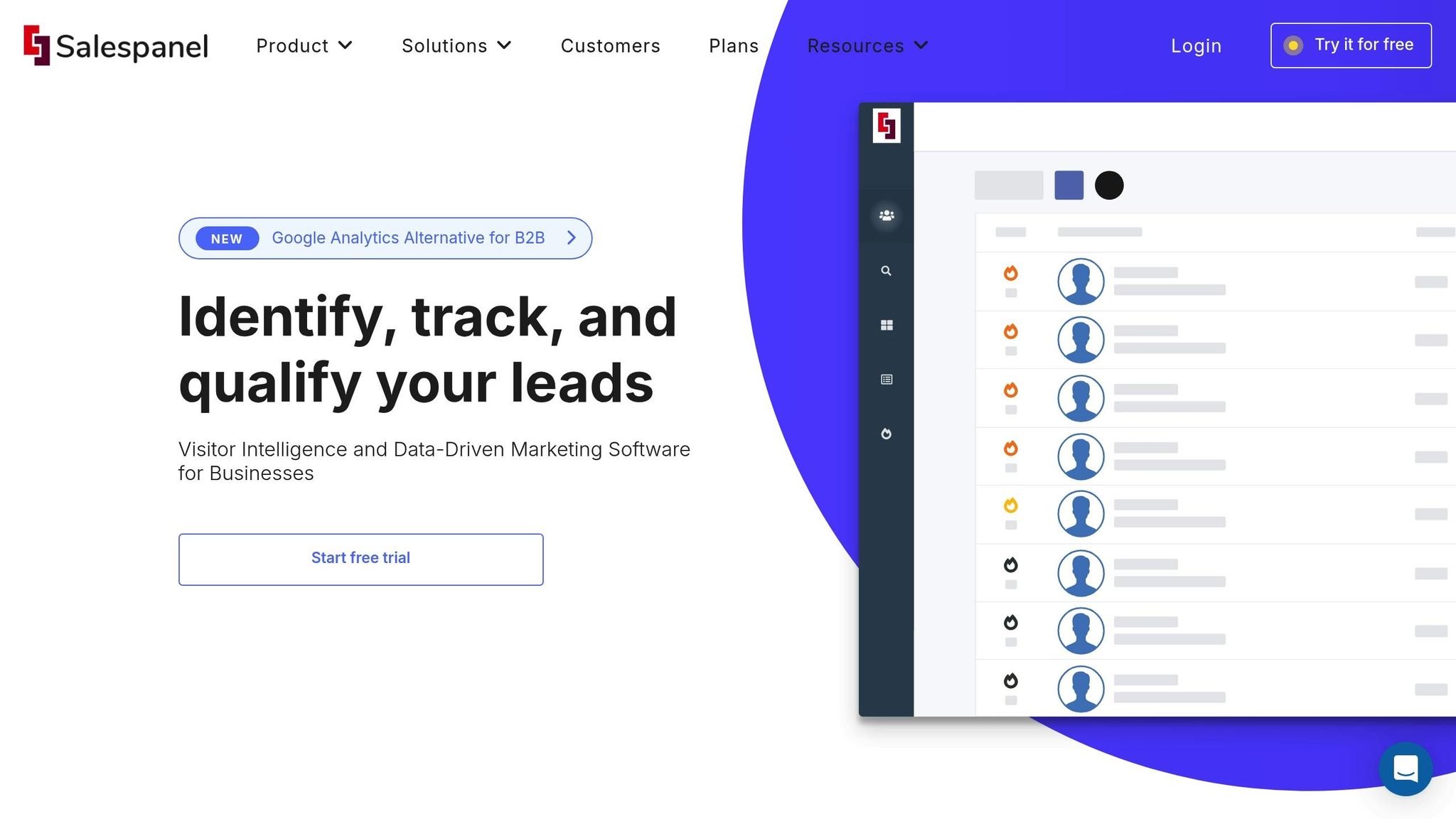
Salespanel is a buyer intent data platform designed to help B2B teams pinpoint companies that are actively exploring their offerings. It achieves this by identifying website visitors in real time and tracking their behavior. Essentially, Salespanel converts anonymous website traffic into actionable insights, matching visitor activity with company profiles and contact details to empower sales teams.
What sets Salespanel apart is its reliance on first-party data collected directly from website interactions. By monitoring how visitors engage with content, pricing pages, and demo requests, the platform provides immediate intent signals that allow sales teams to focus their outreach on the most promising leads. It also excels in multi-touch attribution, giving marketing teams a clear view of which campaigns and channels drive high-intent traffic. Unlike platforms such as Leadsforge, which rely on credit-based models, Salespanel uses real-time data to identify high-intent prospects on the spot. Let’s explore how its features give it an edge over competitors.
Data Accuracy
Salespanel ensures reliable data by tracking actual website visitors in real time and filtering out bots and irrelevant traffic. This approach delivers clean, actionable insights about prospects with genuine interest. By combining first-party behavioral data with third-party validation, the platform minimizes false positives and ensures that sales teams focus on leads with real potential. Salespanel’s intent profiles are built using detailed interaction data, such as page visits, content downloads, time spent on key pages, and repeat visits, giving teams a comprehensive view of each prospect’s interest level.
Integration Capabilities
Salespanel supports intent-driven lead generation by seamlessly integrating with major CRMs like Salesforce, HubSpot, and Pipedrive. This ensures that intent data flows smoothly into existing sales processes. It also connects with popular marketing tools like Mailchimp and ActiveCampaign, while offering API access for custom integrations. Additionally, Salespanel’s compatibility with Zapier extends its connectivity to hundreds of other applications, creating a well-connected ecosystem for sales and marketing teams.
Pricing Transparency
Salespanel offers a flexible pricing model that scales with business needs. Plans start at around $99 per month for the basic tier, with advanced options priced between $249 and $499 per month, depending on features and the volume of tracked leads. For larger organizations with higher data demands, custom enterprise pricing is available. Unlike some competitors that lock users into annual contracts, Salespanel allows for monthly billing, providing businesses with the flexibility to adjust their investment as they grow.
AI-Powered Features
Salespanel incorporates AI to enhance lead qualification and conversion. Its AI-driven lead scoring evaluates behavioral patterns, engagement history, and demographic data to prioritize prospects most likely to convert. Machine learning powers automated segmentation, grouping prospects based on their behavior and intent signals for tailored outreach campaigns. The AI continuously improves its accuracy by learning from successful conversions. According to user feedback, companies using these features have reported up to a 30% increase in qualified leads and faster sales pipeline progression. Additionally, predictive analytics recommend engagement strategies based on similar prospect behaviors, helping sales teams refine their approach for better results.
With a 4.7/5 rating on G2 from over 200 reviews, Salespanel is widely praised for its precise lead identification and seamless integrations.
3. 6sense
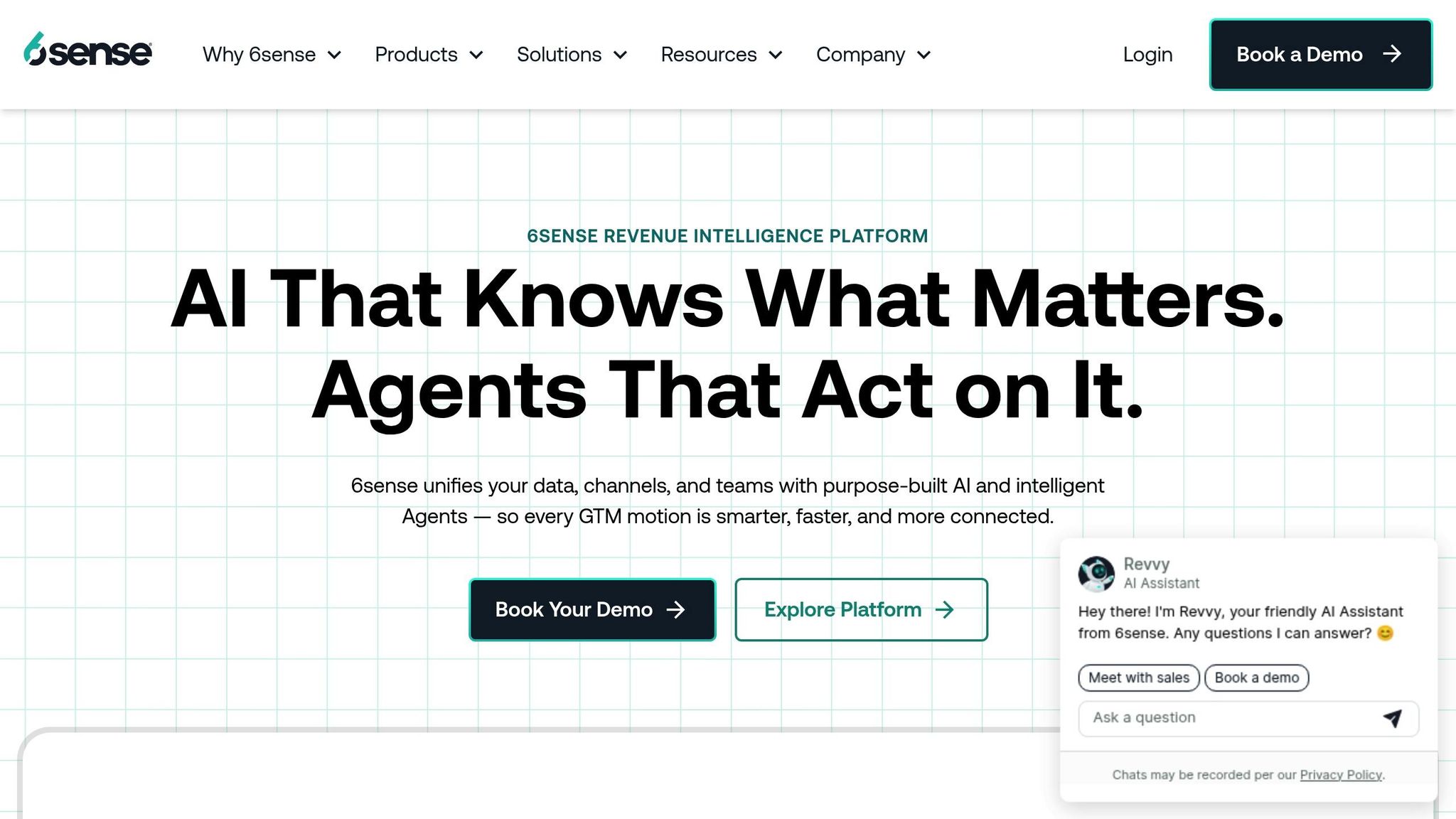
6sense is an Account-Based Marketing (ABM) platform designed to help B2B teams zero in on high-value accounts by combining buyer intent data with predictive analytics. It works by analyzing a variety of digital signals to predict which accounts are most likely to be in the market for specific solutions. At the core of its functionality is the platform's Revenue AI technology, which processes anonymous signals from sources like content consumption, search behaviors, and third-party research.
What sets 6sense apart is its ability to track anonymous research activity across industry sites, review platforms, and competitor content. This helps create detailed intent profiles that sales teams can use to prioritize accounts with the highest likelihood of making a purchase. Unlike tools such as Leadsforge, which focus on converting existing website traffic, 6sense takes a broader approach by uncovering hidden opportunities through its extensive data analysis.
Data Accuracy
6sense delivers precise account-level insights by aggregating buyer intent signals from anonymous web activity. It uses a combination of IP address tracking, device fingerprinting, and behavioral analysis to identify anonymous visitors and build a clearer picture of buyer interest. The platform’s AI validation process continuously refines this data, ensuring accuracy. Additionally, its intent scoring algorithm evaluates a wide range of behavioral signals, creating predictive models that help teams focus their efforts on accounts with genuine potential.
Integration Capabilities
The platform is built to integrate seamlessly with popular CRMs and marketing automation tools like Salesforce, HubSpot, Marketo, and Outreach. Its bi-directional sync allows intent data to flow directly into existing CRM workflows, enriching customer profiles with added insights. For those with specific needs, the platform’s API-first architecture supports custom integrations and data exports. It also includes webhook functionality, enabling automated workflows - for example, notifying sales reps when target accounts ramp up their research activity.
AI-Powered Features
6sense leverages artificial intelligence to enhance its buyer intent capabilities. Its predictive analytics engine forecasts which accounts are likely to enter the buying cycle soon, giving teams a head start. The Dynamic Audiences feature uses machine learning to segment accounts in real time based on their buying stage and intent. Additionally, tools like Conversational Email and Campaign Intelligence help refine outreach strategies by offering tailored messaging and channel recommendations driven by data.
4. ZoomInfo
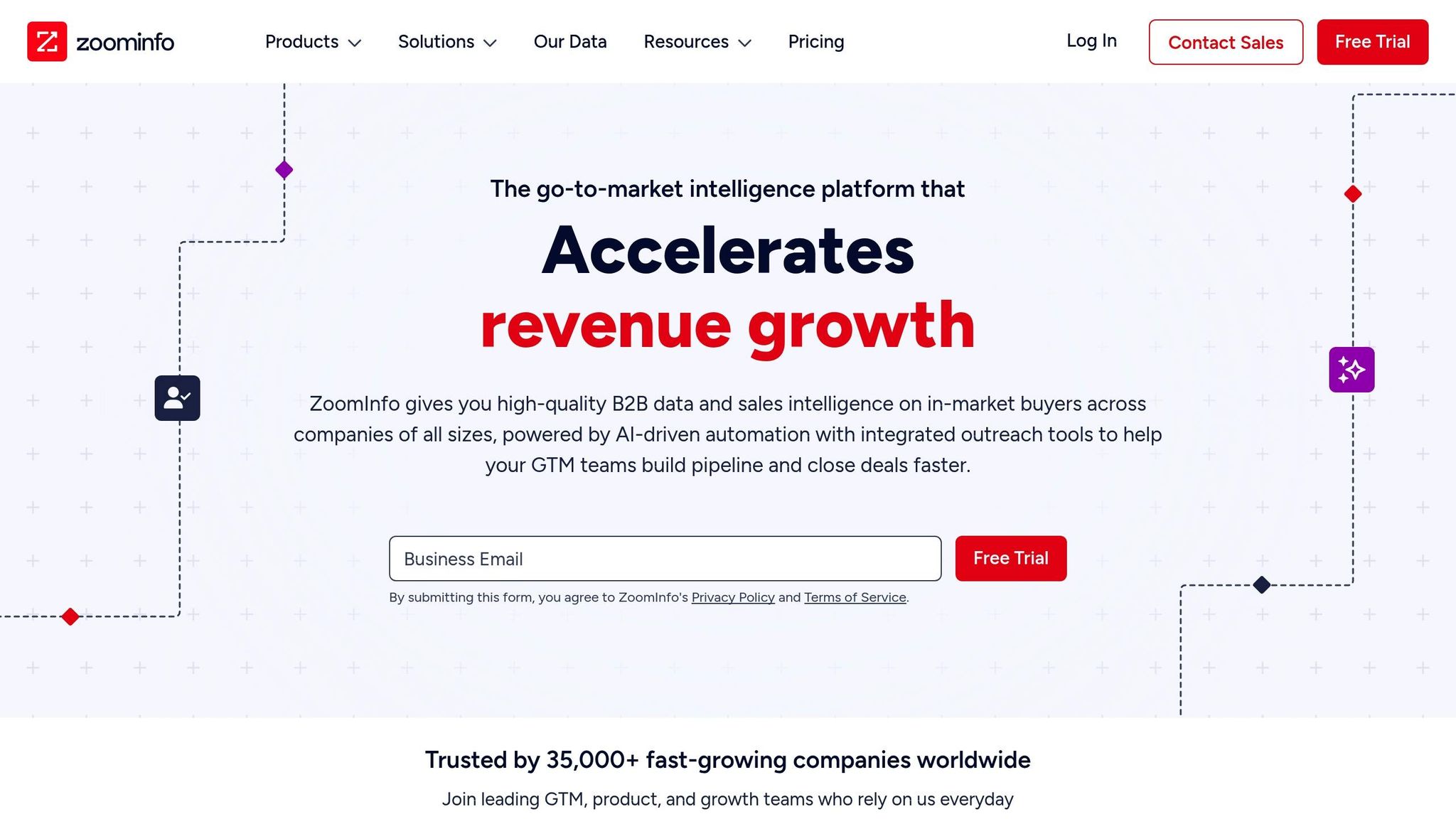
ZoomInfo provides a comprehensive B2B solution that combines contact data with intent signals, making it easier for businesses to identify and connect with potential customers. By monitoring online intent signals and offering verified contact details of decision-makers, ZoomInfo bridges the gap between identifying interest and taking timely action.
The platform tracks intent signals by analyzing online behaviors like content consumption, search patterns, and research activity across business forums, review sites, and industry publications. Paired with an extensive database of verified contacts, this system enables teams to quickly act on buying signals and engage the right people. Below, we’ll explore ZoomInfo’s standout features, focusing on data accuracy, integration options, pricing, and AI tools.
Data Accuracy
ZoomInfo ensures data accuracy through a mix of automated collection, machine learning validation, and human verification. The platform continuously updates its records using streamlined verification methods. Its intent data is sourced by tracking anonymous user behavior across trusted industry publications and research platforms. Additionally, features like real-time alerts notify users about key company changes, such as funding rounds or executive shifts, helping teams spot potential opportunities faster.
Integration Capabilities
ZoomInfo integrates seamlessly with many sales and marketing platforms, including Salesforce, HubSpot, and Microsoft Dynamics. Its workflow automation allows teams to set up trigger-based actions, such as adding high-intent leads to sales sequences or updating CRM lead scores when intent signals rise. A Chrome extension gives sales reps instant access to ZoomInfo data within LinkedIn and Gmail, while robust API and webhook options enable real-time data sync with custom tools. These integrations ensure that intent insights are directly tied to targeted outreach efforts, supporting broader lead generation goals.
Pricing Transparency
ZoomInfo operates on a subscription model with pricing tiers tailored to different team sizes and feature needs. While specific pricing isn’t publicly available, industry sources suggest that plans cater to both small teams and large enterprises. Subscriptions may include options like additional data credits, advanced integrations, and dedicated customer support. The credit-based system for accessing contact and intent data helps businesses budget more predictably.
AI-Powered Features
ZoomInfo leverages AI to boost sales productivity. Its AI assistant automates research tasks and creates personalized outreach messages using aggregated prospect data and intent signals. Predictive lead scoring, powered by machine learning, ranks prospects based on factors like company size, industry, and recent activity. Advanced search features, driven by natural language processing, let users find prospects using conversational queries without needing complex search commands.
5. Bombora
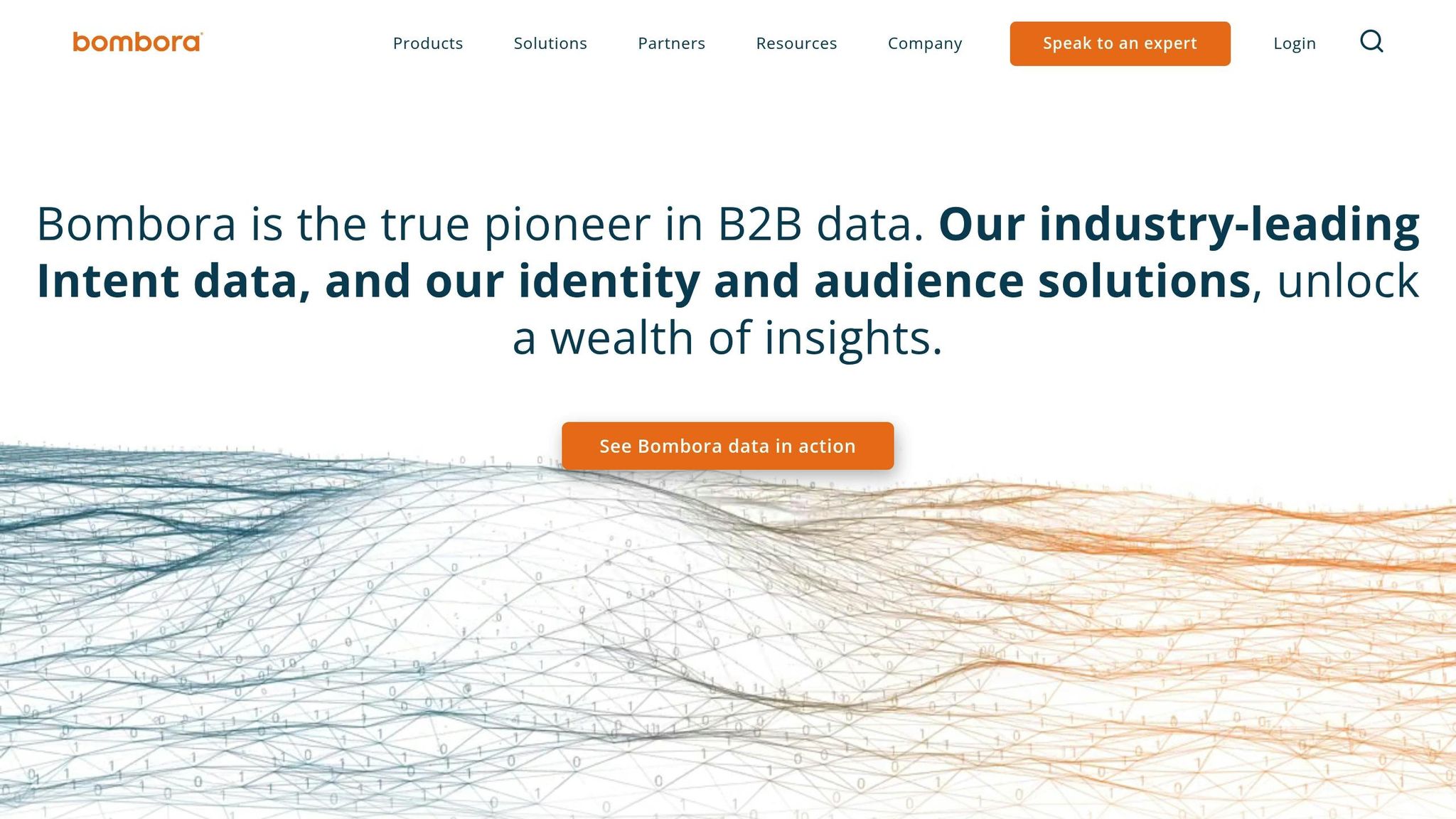
Bombora provides "Company Surge" intent data by tracking content consumption across a network of B2B publishers. The platform identifies when companies show increased research activity on specific topics, such as "marketing automation" or "cybersecurity solutions." When multiple employees from the same company engage with content on similar subjects, Bombora's algorithms detect this surge in interest. This "Company Surge" data highlights organizations likely exploring solutions in those areas. Unlike platforms that focus on individual behavior, Bombora's approach targets collective company activity.
Data Accuracy
Bombora enhances data accuracy through its cooperative network of B2B publishers, which delivers detailed insights into content consumption patterns. A surge alert is triggered only after multiple data points confirm consistent research activity, ensuring random spikes are filtered out. By using statistical models to identify consumption levels that exceed normal baselines, the platform helps businesses focus on accounts with clear intent signals. This method minimizes false positives by emphasizing sustained activity over isolated interactions.
Integration Capabilities
Bombora seamlessly integrates with platforms like Salesforce, HubSpot, Marketo, and Pardot. These integrations allow automatic lead score updates when companies show surge activity, enabling marketing teams to launch targeted campaigns at the right time. Additionally, Bombora offers API access for custom integrations and data exports, making it easy for sales teams to incorporate intent data into their workflows. Account-based marketing teams can also use this data to coordinate multi-channel campaigns effectively.
Pricing Transparency
Bombora follows a subscription-based model tailored to data volume and integration needs. It offers tiered options to accommodate varying monitoring requirements and update frequencies. For enterprise customers, custom pricing can be negotiated based on the complexity of their data and integration demands. While specific pricing details aren’t publicly available, Bombora’s solutions are generally aimed at mid-market to enterprise-level organizations that benefit from intent-driven insights.
AI-Powered Features
Bombora leverages machine learning to fine-tune its surge detection process, reducing false alerts by analyzing content consumption trends across industries. This ensures that alerts represent genuine buying interest rather than routine research. The platform also uses predictive tools for topic clustering and trend analysis, giving sales teams a clearer understanding of the context behind prospect activity. These insights help teams have more meaningful and informed conversations with potential clients.
6. Cognism
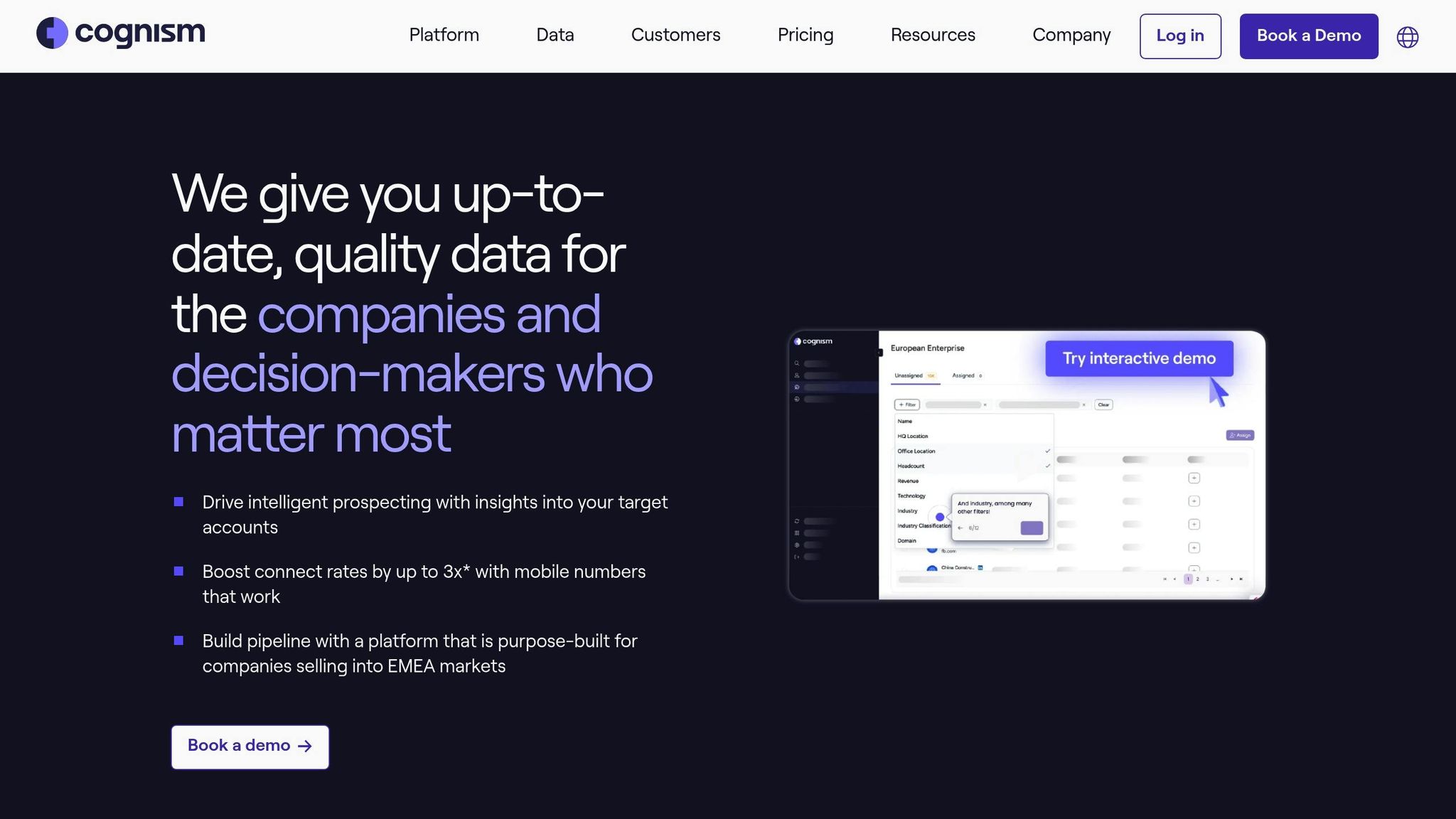
Cognism combines Bombora's intent signals with its Diamond Data® verified contact database to provide actionable insights for prospecting. The platform identifies companies exploring topics such as "CRM software" or "data security solutions" and matches these behavioral signals with phone-verified contact details. Case studies show that this approach can lead to a notable increase in opportunity generation. By aligning intent signals with verified contact data, Cognism ensures a higher level of accuracy for sales teams.
A standout feature of Cognism is its strong presence in the European market, where it claims 98% data accuracy, compared to competitors' rates of about 85%. While these figures are self-reported and not independently verified, the platform's focus on data precision gives it an edge, particularly in regions with strict data regulations.
Data Accuracy
Cognism's Diamond Data® verification process plays a key role in maintaining its high data accuracy. By confirming mobile contacts and frequently refreshing its database, it filters out irrelevant research activity. This dual approach - merging intent signals with verified contact data - helps sales teams concentrate on prospects who have shown genuine interest.
Its European market focus provides an additional advantage, as the platform adheres to GDPR-compliant data collection practices. This ensures more reliable data for businesses operating in the EU. Jonny Fianu, Global Head of Revenue Operations at ComplyAdvantage, highlighted the platform's reliability:
"The coverage is wider and the mobile phone numbers are substantially better"
when comparing Cognism to other solutions. For sales teams, this reliability is crucial when acting on intent signals in real time.
Integration Capabilities
Cognism integrates effortlessly with top sales and marketing platforms like Salesforce, HubSpot, and Pipedrive, enabling automated lead scoring updates based on intent signals. A Chrome extension provides real-time prospecting capabilities, while API connections allow teams to create custom workflows. Sales teams can also set up alerts for surge activity in target accounts, ensuring timely outreach when prospects are actively researching.
The platform's integration extends to marketing automation tools such as Marketo and Pardot, allowing marketing teams to launch targeted campaigns precisely when intent data signals readiness to buy. This is especially beneficial for account-based marketing strategies, where real-time intent data and verified contact details enable coordinated, multi-channel outreach.
Pricing Transparency
Cognism operates on a customized pricing model, requiring potential customers to contact their sales team for specific quotes. The platform offers two primary tiers: Platinum (entry-level) and Diamond (premium). Annual costs range from $1,500 to over $25,000, depending on team size and features. The Diamond tier starts at a $25,000 base fee, with an additional $2,500 per user annually.
Renewal costs typically rise by 10-15% annually, unless a multi-year agreement is secured. For businesses looking to track additional intent topics, prices range from $200 to $400 per topic annually, with discounts available for bundled topics, reducing costs to $75-$150 per topic. George McKenna, Head of Cloud Sales at Ultima, shared his experience:
"Our sales cycle is typically 6-8 months long. With Cognism, we saw ROI in 8 weeks from intent data and direct dials. One deal pays for a year's Cognism subscription"
.
AI-Powered Features
Cognism uses machine learning to refine intent signal accuracy and reduce irrelevant data. Its AI capabilities analyze content consumption patterns to identify genuine buying committees rather than individual researchers. This allows sales teams to focus on accounts where multiple stakeholders are involved in coordinated research, signaling serious purchase intent.
The platform also offers predictive lead scoring, combining intent signals with engagement history to prioritize outreach efforts. Sales teams receive tailored recommendations on the best timing and messaging for contacting prospects, based on the topics they’ve been researching. This contextual approach enables more meaningful conversations and improves connection rates with verified mobile contacts.
7. Demandbase
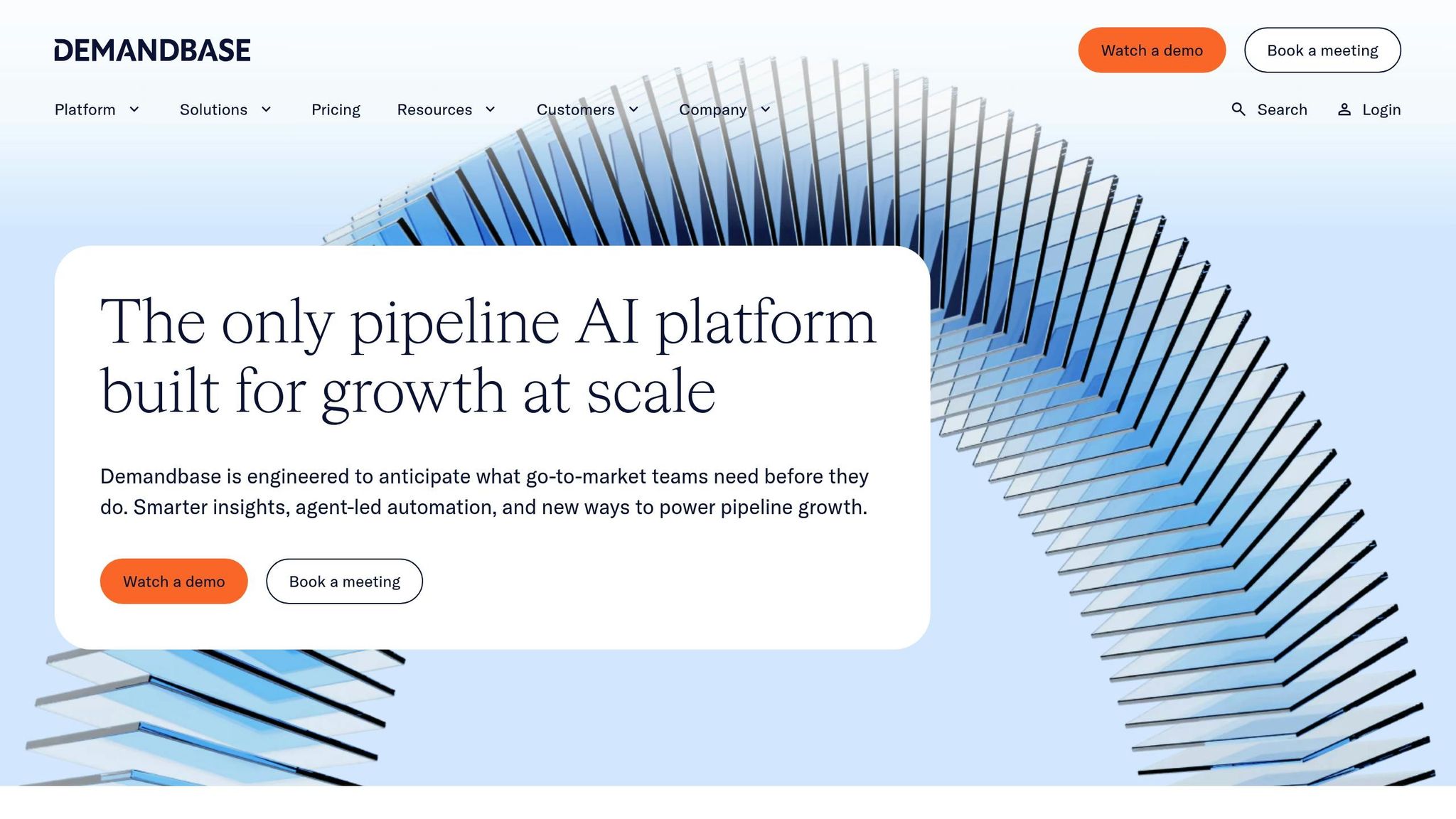
Demandbase is an ABM platform that combines buyer intent data with account identification, personalization, and advertising tools. Instead of just providing intent data, it integrates these elements into a single revenue-focused platform. By tracking digital interactions, it helps pinpoint when target accounts are actively researching solutions in your industry.
The platform collects intent data from various sources, including its own content syndication network, third-party publishers, and website visitor identification technology. It can even identify anonymous website visitors and match their activity to specific companies. This gives sales teams real-time alerts when target accounts visit their site or engage with relevant content. By merging intent signals with digital behavior insights, Demandbase ensures precise identification of target accounts.
Data Accuracy
Demandbase prioritizes accuracy by combining machine learning with human validation. It processes intent signals from a wide range of B2B publishers and uses proprietary algorithms to filter out irrelevant data while focusing on consistent buying behaviors. Its Account Intelligence feature enhances accuracy by identifying companies based on website visitor data, offering a more reliable alternative to traditional IP-based methods.
The platform's intent scoring system evaluates key factors like recency, frequency, and engagement depth across multiple interactions to rank accounts effectively. With regularly updated intent data, sales teams receive alerts when target accounts ramp up their research activity. Additionally, industry-specific filters help eliminate irrelevant engagements, ensuring cleaner data. This precise intent data integrates seamlessly with CRMs and marketing tools for streamlined workflows.
Integration Capabilities
Demandbase integrates with top CRMs like Salesforce, Microsoft Dynamics, and HubSpot, making it easy to incorporate into existing workflows. Its Salesforce integration, for example, supports custom objects and fields, allowing sales teams to track intent history and engagement trends over time.
The platform also offers a robust API for custom integrations with tools like marketing automation platforms, sales engagement systems, and business intelligence software. Marketing teams can connect Demandbase with platforms like Marketo, Eloqua, and Pardot to trigger campaigns based on intent signals. Meanwhile, sales teams can use integrations with tools like Outreach, SalesLoft, and Gong to enhance their prospecting efforts.
For added convenience, a Chrome extension delivers real-time account insights directly within web applications, ensuring that critical data is always at hand.
Pricing Transparency
Demandbase operates on a subscription model, with costs scaling based on the number of target accounts, data sources, and features included. Pricing typically involves annual contracts, with the overall cost determined by the level of ABM functionality and data capabilities needed.
AI-Powered Features
Artificial intelligence plays a key role in Demandbase’s platform, from identifying intent signals to prioritizing target accounts. Its AI algorithms analyze patterns in content consumption and engagement to predict which accounts are entering active buying cycles. The Account Intelligence AI also surfaces valuable insights about target accounts, such as recent news, leadership changes, or technology investments that may signal buying intent.
8. Lead Forensics
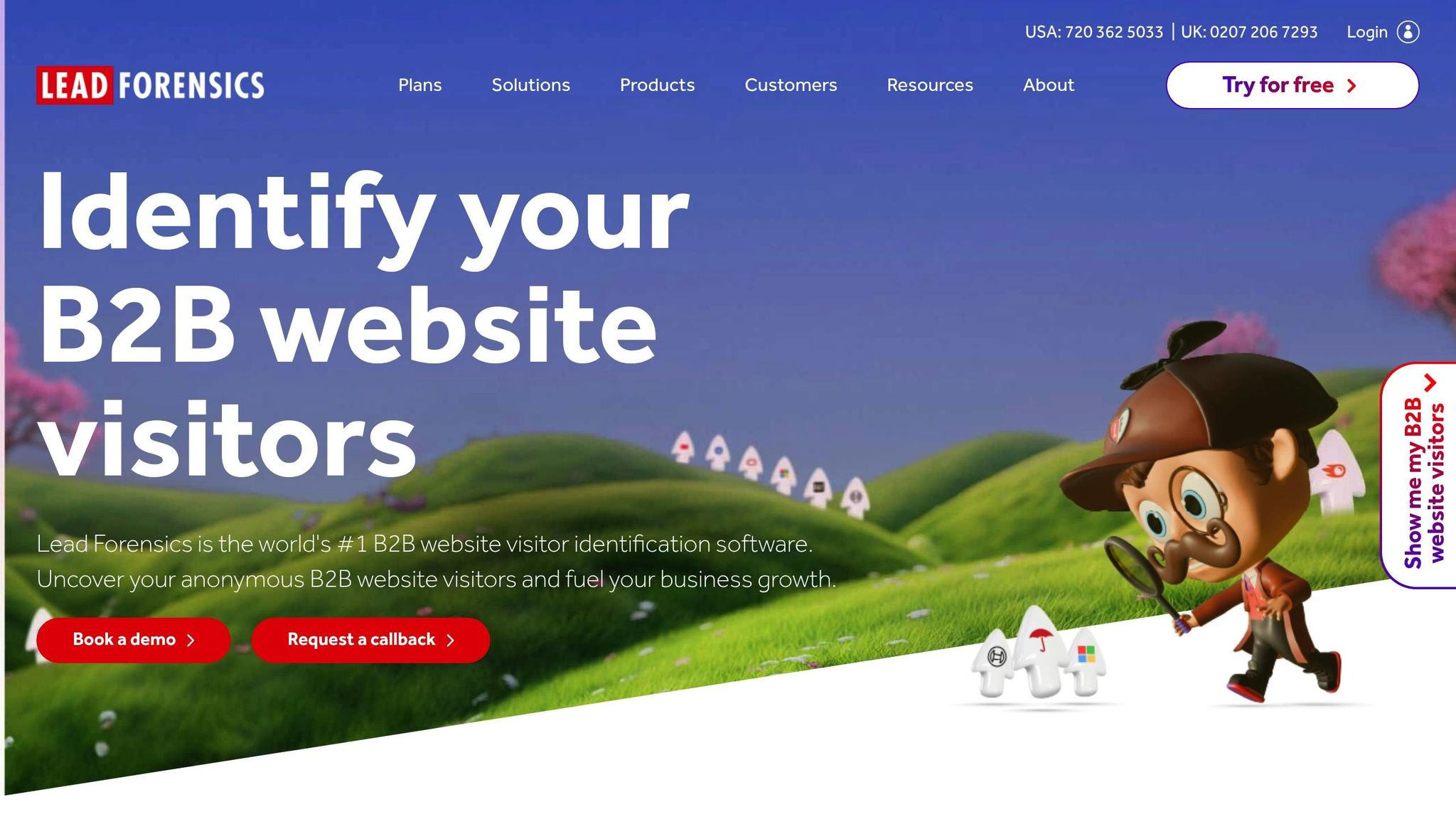
Lead Forensics helps uncover anonymous website visitors and turns their activity into actionable leads by linking IP addresses to a company database. By tracking visitor behavior and analyzing IP data, it connects the dots, giving sales teams a clear picture of which businesses are exploring their products or services. The platform even sends real-time alerts when target companies check out specific pages, enabling sales teams to engage prospects at just the right time.
Beyond identifying leads, Lead Forensics streamlines workflows by integrating seamlessly with popular CRM systems.
Integration Capabilities
Lead Forensics works with CRMs like Pipeline, HubSpot, and Salesforce. It also sends instant notifications through Slack, email, or CRM updates whenever a target company visits your site. For larger businesses, it offers automatic CRM updates to ensure all data stays current within your existing systems.
9. G2 Buyer Intent

G2 Buyer Intent leverages its vast database of software reviews to pinpoint companies actively searching for solutions. Unlike traditional intent data providers that depend on third-party tracking, G2 gathers first-party signals directly from millions of professionals who visit the platform to compare software, read reviews, and evaluate vendors.
The platform monitors actions like prospects engaging with competitor profiles, downloading comparison reports, or researching specific software categories. This targeted approach ensures reliable intent signals because G2 users are already in the buying cycle, actively seeking solutions.
What sets G2 apart from competitors like Bombora or 6sense is its focus on software purchasing intent rather than broader, topic-based research. For example, if a prospect downloads a comparison chart between your product and a competitor or reads reviews within your category, G2 highlights these as high-intent activities.
Data Accuracy
G2 Buyer Intent stands out with its precise insights, built on verified user interactions within the platform. Unlike cookie-based tracking, G2's data reflects genuine purchase consideration, as users voluntarily engage with reviews and comparisons. This creates intent signals that are far more reliable than casual browsing behavior.
The platform doesn’t just identify companies showing interest - it pinpoints specific individuals within target accounts who are actively researching solutions. This company- and contact-level data helps sales teams understand not only which organizations are in the market but also who within those companies is driving the decision-making process.
That said, G2's intent data is tailored to software and technology solutions, making it less relevant for businesses outside the tech industry, such as those selling physical products, professional services, or non-tech solutions. While its strength lies in software intent, this specialization can be a drawback for industries beyond technology.
Integration Capabilities
G2 Buyer Intent also shines with its seamless integration options. It connects effortlessly with major CRMs like Salesforce, HubSpot, and Pipedrive, as well as marketing platforms such as Marketo and Pardot. These integrations allow businesses to sync intent scores and activity details with lead records, enabling timely and targeted outreach. Sales teams can receive notifications when target accounts show buying signals, ensuring they engage prospects during critical evaluation stages.
Additionally, G2 integrates with sales engagement platforms like Outreach and SalesLoft, enabling personalized follow-ups. Sales reps can reference specific research activities, such as a prospect evaluating solutions in their category, to create more relevant and timely conversations. This level of personalization helps foster stronger connections and increases the chances of closing deals.
10. TechTarget Priority Engine
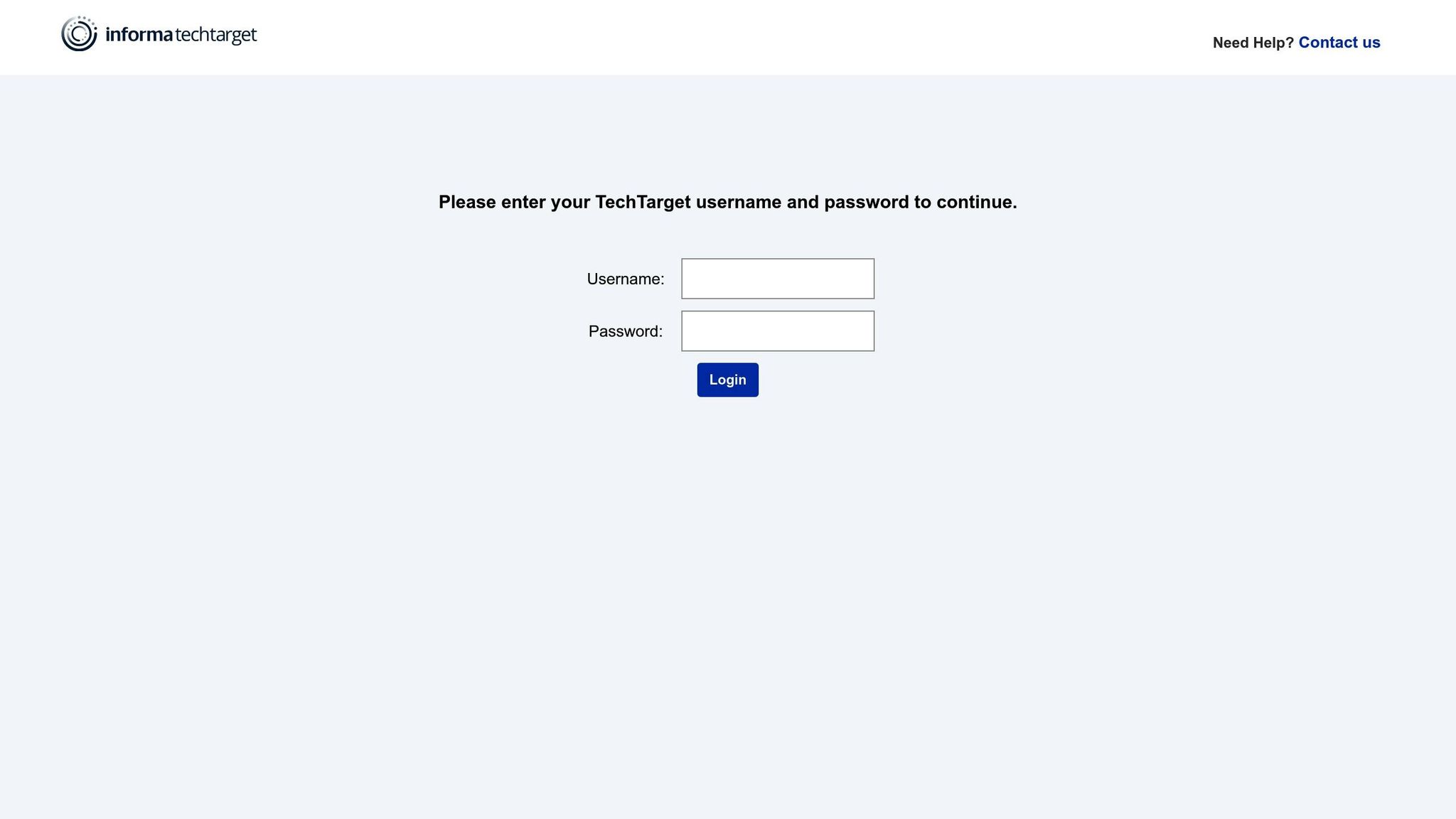
TechTarget Priority Engine zeroes in on tech purchase intent by tapping into TechTarget's extensive IT network. The platform captures intent signals from IT professionals and decision-makers actively researching technology solutions. Unlike general intent platforms, this tool is tailored specifically for B2B tech companies, software vendors, and IT service providers looking to connect with prospects already exploring their options.
What sets this platform apart is its ability to identify buying groups within target accounts. This means it doesn't just spotlight a single lead - it uncovers the entire decision-making unit, including technical evaluators, budget holders, and end users involved in the purchasing process. These capabilities are further enhanced by advanced AI-driven personalization and seamless integrations, as outlined below.
AI-Powered Features
IntentMail AI, created in collaboration with Autobound, takes email personalization to the next level. It uses over 350 external data points - such as financial details, technographic insights, news, and social media signals - to draft hyper-personalized outreach. In 2026, this feature boosted retention rates by 30% and produced emails 60–120 times faster than manual methods, delivering over 250,000 messages to more than 3,000 customers. By automating the "what to say" dilemma, IntentMail AI frees up sales teams to focus on building relationships and closing deals.
Integration Capabilities
TechTarget Priority Engine integrates effortlessly with popular tools like Salesforce, HubSpot, Marketo, and Eloqua, syncing intent scores and buying group data directly into existing workflows. Its Salesloft integration simplifies operations by allowing teams to instantly add active prospects to Salesloft cadences and automate weekly bulk exports.
In late 2024, the platform introduced the Priority Engine Demand module, which delivers leads and buying group members directly to customers' CRM and marketing automation systems. Beyond its default automation and direct integration features, the module also lets users download lead and buying group data directly from the platform. Additionally, it works with Octane11, a data orchestration tool that enriches and organizes B2B data. This integration allows users to push enhanced data to platforms like Salesforce, Outreach, or Salesloft, ensuring a smooth flow of qualified prospects into sales and marketing pipelines.
11. Lusha
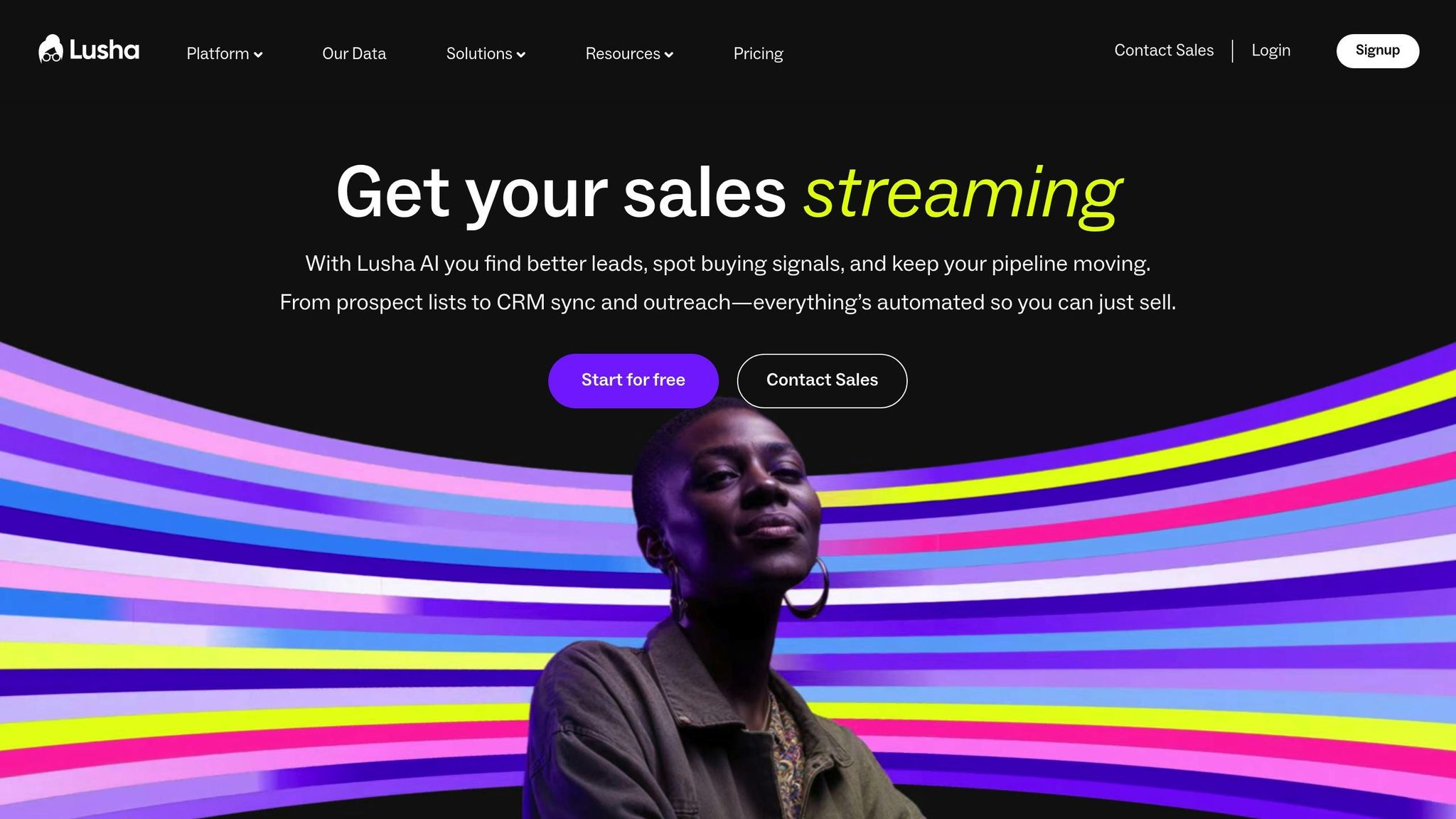
Lusha is a B2B contact database designed to sync contact information seamlessly with widely-used CRMs. This feature makes outreach smoother and helps teams work more efficiently. Its integration options are a key part of what makes it an effective tool.
Integration Capabilities
One of Lusha's most notable features is its user-friendly Chrome extension, which allows users to transfer contact data directly into their sales platforms with minimal effort. A verified G2 reviewer highlighted this ease of use, saying:
"The Chrome extension is easy to set up and use".
12. Lead Onion
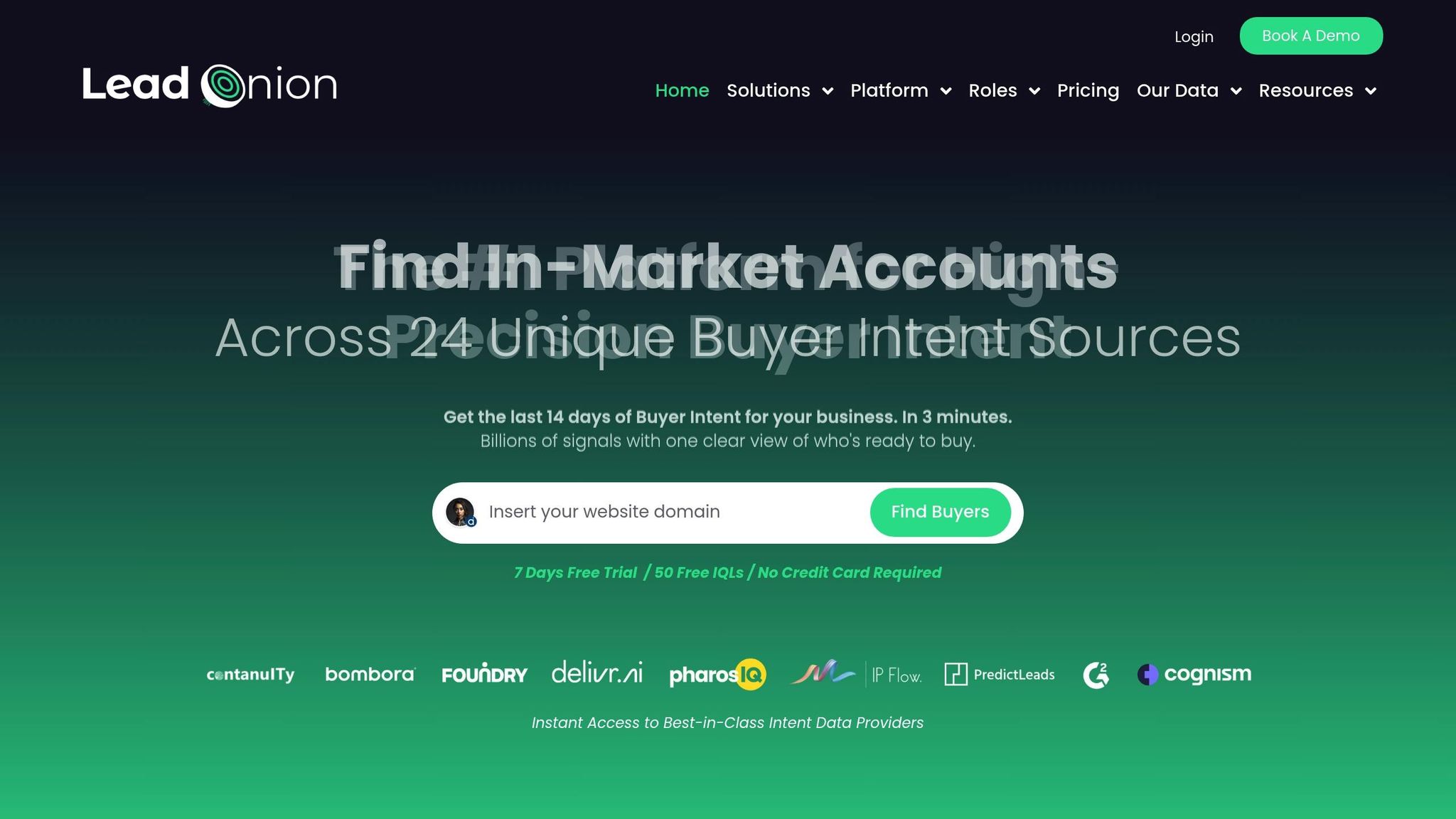
Lead Onion is a provider of buyer intent data, designed to help businesses identify potential customers based on their online research behaviors. Let’s take a closer look at how Lead Onion’s integrations and data capabilities support sophisticated buyer intent strategies.
Integration Capabilities
Lead Onion connects seamlessly with many widely-used CRMs and marketing automation tools. Supported platforms include:
"Integrations include Salesforce, HubSpot, Marketo, Pardot, Oracle Eloqua, Microsoft Dynamics 365, LinkedIn, Slack, Google Workspace, and Mailchimp."
These integrations allow teams to bring buyer intent signals directly into their existing systems, streamlining workflows and enhancing decision-making processes.
Data Accuracy
While Lead Onion offers powerful insights, its setup process can be intricate. This platform is best suited for organizations equipped with skilled data analysts or dedicated marketing operations teams to handle its advanced data analysis needs.
13. Artisan
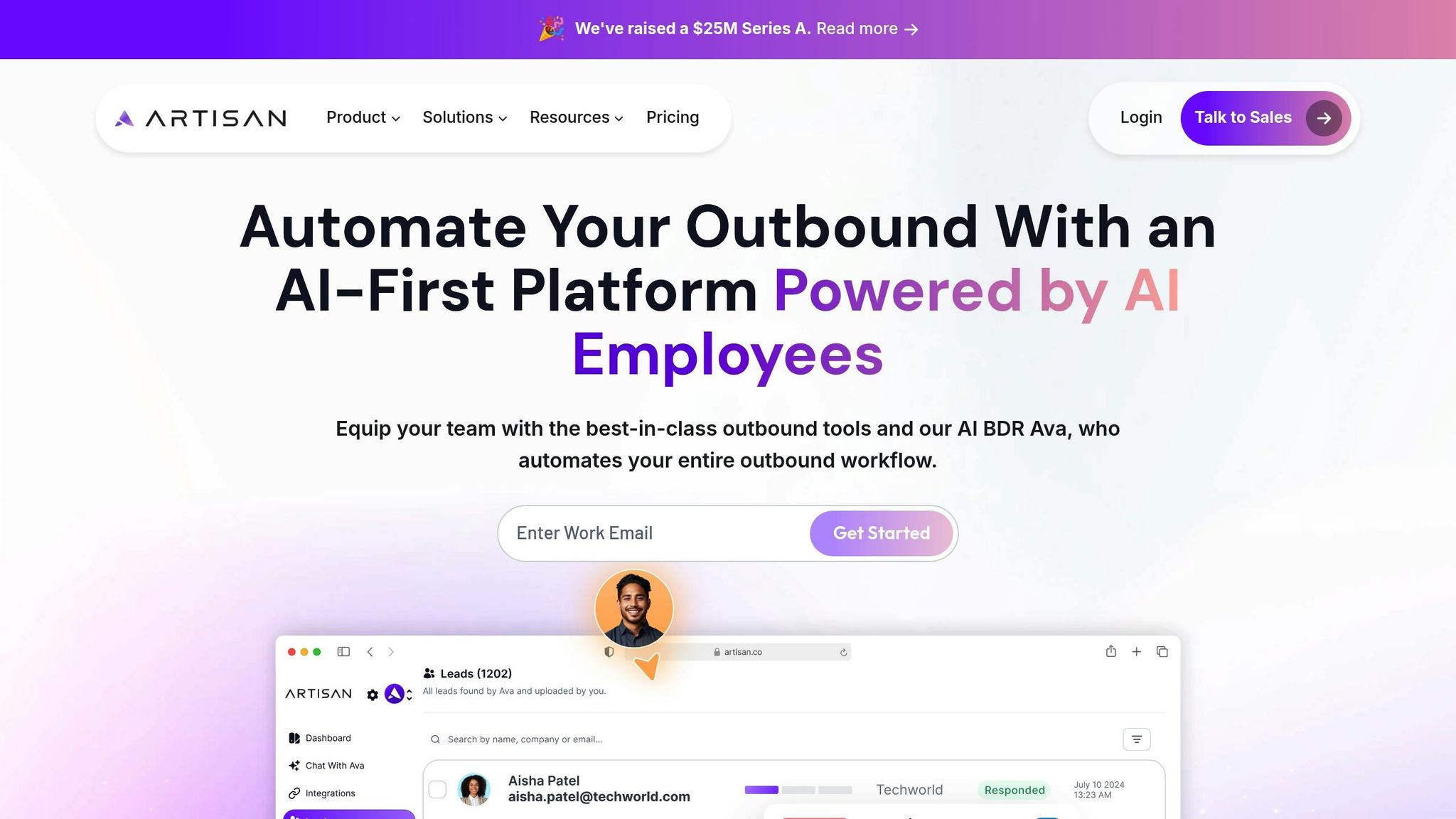
Artisan doesn’t just stop at generating intent signals - it takes the extra step of turning those insights into meaningful engagement. This AI-driven sales platform not only delivers buyer intent data but also automates outreach, helping sales teams connect with prospects more effectively. At the heart of Artisan’s offering is its AI-powered BDR, Ava, which transforms how sales teams operate.
AI-Powered Features
Ava, Artisan's AI BDR, handles the entire buyer intent process seamlessly - from researching prospects to executing multi-channel outreach. It evaluates and ranks leads based on their likelihood to make a purchase. By analyzing data in real time, the platform fine-tunes strategies and detects intent signals across various online touchpoints. Once high-intent prospects are identified, Ava steps in with tailored outreach, using insights gathered from multiple channels to create a personalized approach.
Integration Capabilities
Artisan simplifies data management by automatically syncing information with CRMs. Its integration capabilities bring together data from different sources, ensuring that buyer intent signals are seamlessly incorporated into existing workflows. This allows sales teams to stay aligned and efficient without disrupting their current processes.
Flexible Pricing
Artisan offers a pricing model tailored to individual business needs. Instead of fixed tiers, costs are based on factors like usage, scale, and outreach volume. Whether you’re running a small targeted campaign or managing large-scale operations, you only pay for what you need. For a personalized quote, reach out to the Artisan sales team.
14. DealSignal
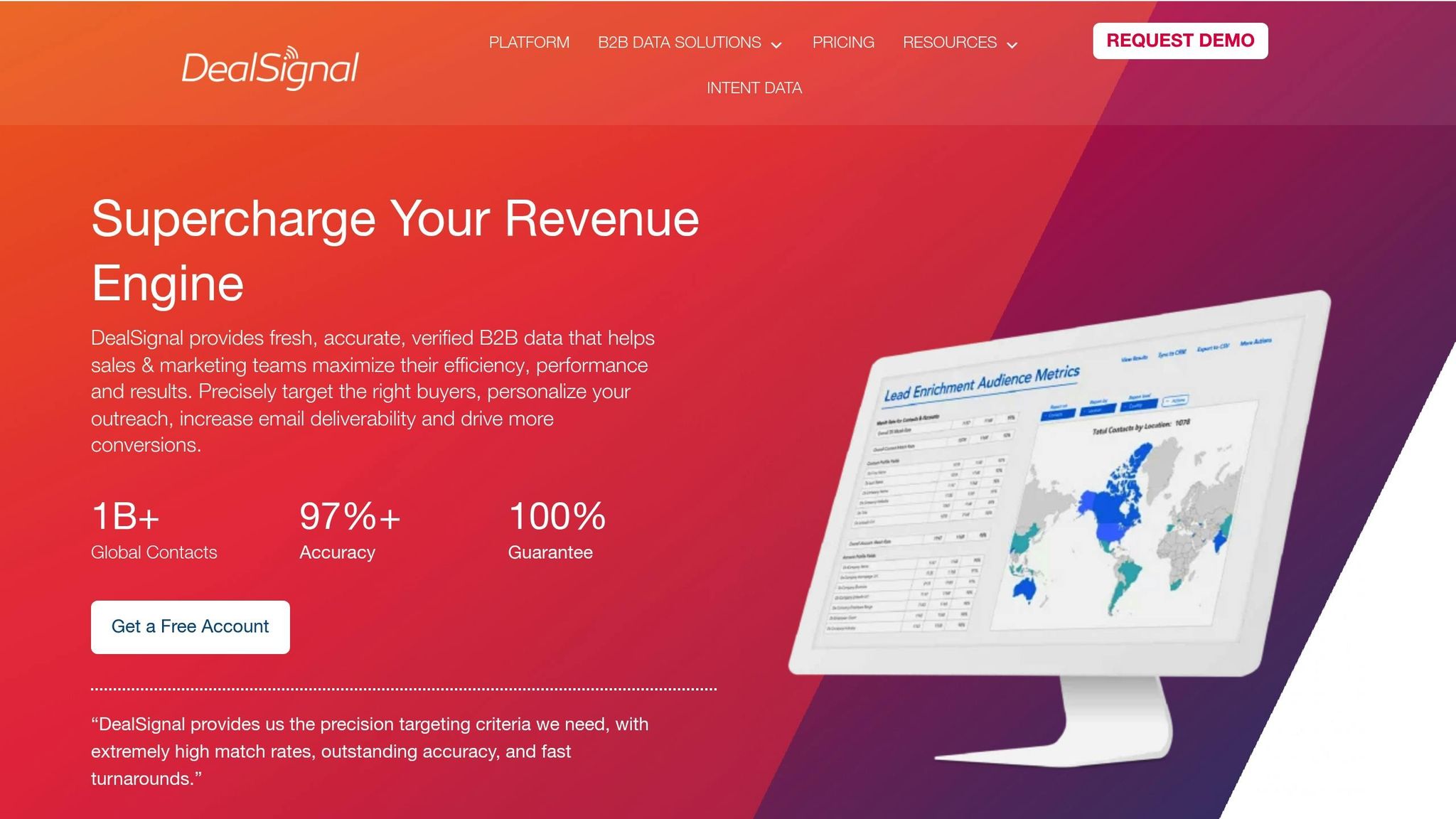
DealSignal combines the precision of AI with human expertise to provide accurate and reliable B2B data. The platform prioritizes quality over sheer volume, using a unique process to deliver dependable contact information and intent signals for sales teams.
Data Accuracy
DealSignal puts a strong emphasis on delivering high-quality data. By blending AI, machine learning, and human verification, its multi-layered system ensures every piece of data is rechecked before it reaches you. This rigorous process results in over 97% verified accuracy, backed by a 100% accuracy guarantee. The proprietary method involves precision targeting, dynamic data sourcing, triangulation, enrichment, and verification, which creates a feedback loop that continuously improves data quality. This thorough validation process forms the backbone for the platform's AI-driven tools.
AI-Powered Features
Once the data is verified, DealSignal uses AI to take lead generation to the next level. Its dynamic, multi-step verification system enriches inbound leads with verified contact details, account data, and intent topics, then assigns intent scores before syncing everything with your CRM. This automated workflow helps sales teams pinpoint potential buyers with greater accuracy while keeping contact information current and reliable.
Integration Capabilities
DealSignal also excels in integration, making it easy to connect with your existing tools. The platform offers bi-directional integration with popular CRM systems and marketing platforms like Salesforce and HubSpot. Its CRM Data Health module works directly with Salesforce to regularly refresh, enrich, and reverify CRM data. You can sync enriched data back into your CRM by either updating existing records or creating new ones using predefined mapping setups.
15. UserGems
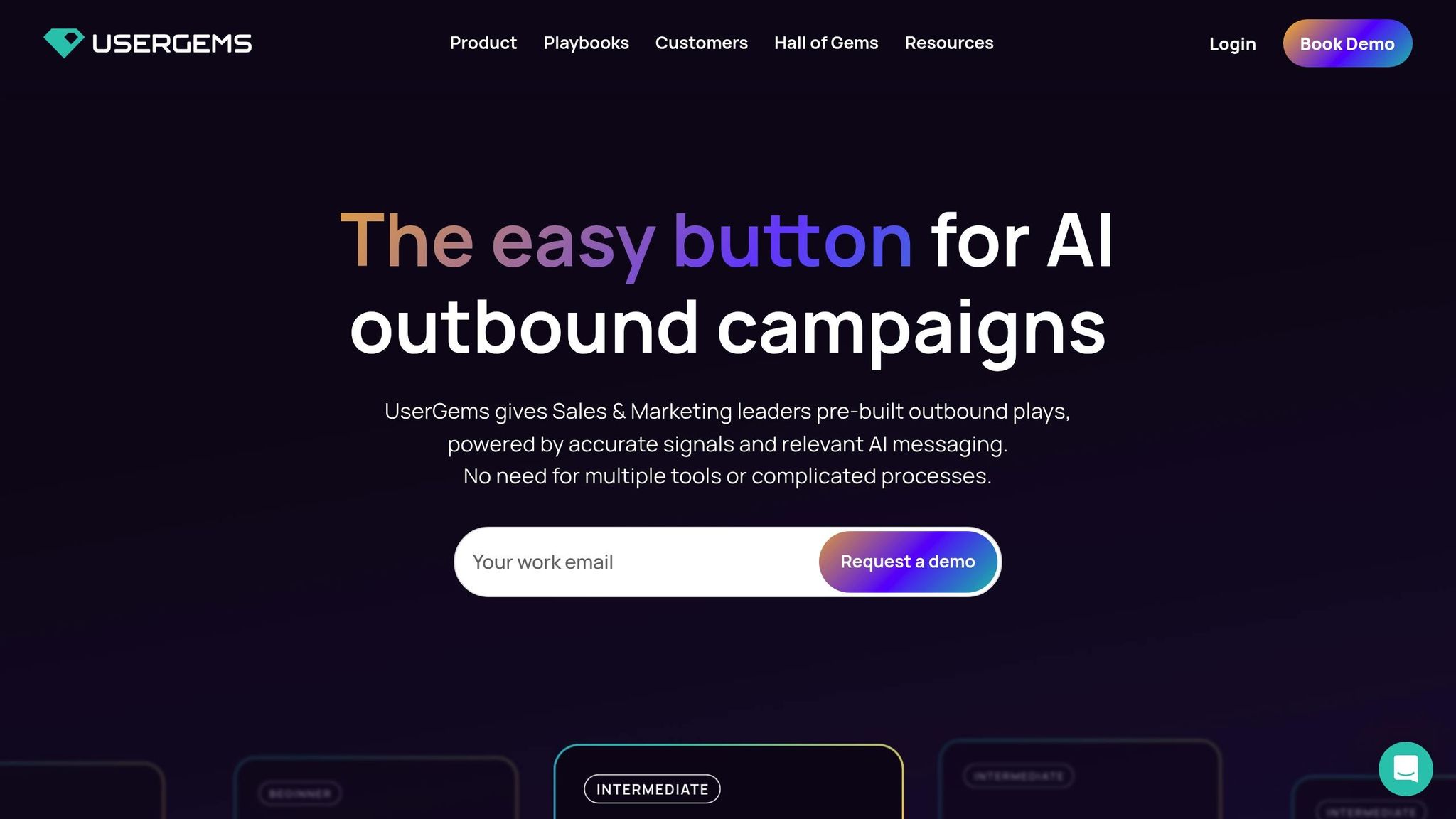
UserGems leverages relationship intelligence to transform career changes into valuable sales opportunities. By tracking when your champions, customers, or prospects move to new roles, the platform helps sales teams reconnect with proven buyers. This focus on relationship-driven sales is backed by accurate data, smart prioritization, and smooth integration with popular tools.
Data Accuracy
UserGems is all about reliable data. It continuously cross-checks professional networks and company databases to track real-time job changes. By verifying employment updates and contact details across multiple sources, the platform ensures the alerts you receive are timely and actionable. Plus, it keeps a record of past interactions, providing helpful context about previous relationships and purchase decisions. This historical insight can shape your outreach strategy and make your connections more meaningful.
AI-Powered Features
UserGems uses AI to uncover valuable opportunities hidden in your sales history. It identifies key relationships and predicts the best time to reach out after a job change, factoring in industry trends and role transitions. The platform also analyzes past deals to pinpoint the types of contacts most likely to convert into customers, ensuring your team focuses on the most promising leads. On top of that, its machine learning capabilities can identify lookalike prospects, expanding your potential customer base beyond direct connections.
Integration Capabilities
UserGems works effortlessly with popular CRM systems like Salesforce, HubSpot, and Pipedrive. It can trigger automated workflows in sales engagement tools such as Outreach and SalesLoft whenever a key contact changes jobs. The platform also integrates with marketing automation tools, ensuring relationship-based opportunities are woven into your broader campaigns. With custom field mapping options, UserGems makes it easy to incorporate relationship insights and intent signals into your existing processes.
Pricing Transparency
UserGems stands out with its straightforward pricing model, making budgeting easier for sales teams. Plans start at around $500 per month for smaller teams and are based on the number of contacts you want to track. Each pricing tier clearly outlines what’s included - such as the number of tracked relationships, integration options, and support levels. Unlike other providers that charge based on data usage or query volume, UserGems offers a predictable cost structure, perfect for teams focused on maintaining long-term relationship intelligence.
Provider Comparison Table
This table offers a snapshot of 15 top buyer intent data providers, focusing on their features, use cases, integrations, and pricing. It's designed to complement the detailed reviews, giving you a quick reference to compare options. Use this alongside the in-depth analysis to determine which solution aligns with your team's goals.
| Provider | Data Type | Main Features | Best Use Cases | Integration Options | Pricing Transparency |
|---|---|---|---|---|---|
| Leadsforge | AI-driven lead generation with intent signals | Chat-like interface, automated data enrichment, company lookalikes, waterfall enrichment | Small to mid-size B2B teams looking for affordable, user-friendly lead generation | Works with Salesforge, CRM systems, and downloadable lists | High - $49/month base plan, credit-based model, includes 100 free credits |
| Salespanel | Website visitor tracking and behavioral data | Real-time visitor identification, lead scoring, behavioral analytics | Companies aiming to identify and nurture website visitors | CRM integrations, marketing automation platforms, API access | Medium - Tiered pricing based on tracked visitors |
| 6sense | Account-based intent data and predictive analytics | AI-driven account identification, intent scoring, predictive modeling | Large enterprises with complex sales cycles and ABM strategies | Extensive CRM and marketing stack integrations, native ABM tools | Low - Custom enterprise pricing, no public rates |
| ZoomInfo | Contact database with intent insights | Comprehensive B2B database, technographic data, intent signals | Sales teams needing extensive contact data plus buying signals | Salesforce, HubSpot, Outreach, and 300+ integrations | Medium - Subscription-based, pricing varies by features |
| Bombora | Company surge data and topic-based intent | Intent topics, company surge scoring, audience targeting | Marketing teams focused on content targeting and demand generation | Data partnerships, programmatic advertising, marketing platforms | Low - Enterprise licensing model, custom pricing |
| Cognism | Global B2B database with compliance focus | GDPR-compliant data, phone-verified contacts, intent data overlay | International companies requiring compliant prospecting data | CRM systems, sales engagement platforms, marketing automation | Medium - Per-user pricing with data credit system |
| Demandbase | Account intelligence and ABM platform | Account identification, personalization, advertising, analytics | Large B2B companies with dedicated ABM programs | Marketing clouds, CRM platforms, advertising networks | Low - Enterprise ABM platform pricing, custom quotes |
| Lead Forensics | Website visitor identification | Anonymous visitor tracking, lead alerts, behavioral insights | B2B companies wanting to identify website visitors for follow-up | CRM integration, email marketing platforms, sales tools | Medium - Monthly subscription based on website traffic |
| G2 Buyer Intent | Software buying intent from G2 platform | Research behavior tracking, category intent, competitor insights | Software and SaaS companies selling through G2 marketplace | G2 native tools, CRM integrations, marketing platforms | High - Transparent pricing |
| TechTarget Priority Engine | IT purchase intent data | IT buyer research tracking, account prioritization, content syndication | Technology vendors targeting IT decision-makers | Marketing automation, CRM systems, content platforms | Low - Custom enterprise pricing for IT marketers |
| Lusha | Contact enrichment with intent insights | Email finder, phone numbers, intent signals, prospecting tools | Sales reps needing quick contact enrichment with buying signals | LinkedIn, CRM systems, sales engagement tools | High - Freemium model with clear per-credit pricing |
| Lead Onion | Technographic and firmographic data | Technology stack identification, company insights, contact data | Sales teams targeting specific technology users | CRM integrations, sales tools, API access | Medium - Subscription pricing with data allowances |
| Artisan | AI-powered sales intelligence | AI sales agents, automated prospecting, intent identification | Companies wanting AI-driven sales automation | Native AI tools, CRM connectivity, sales platforms | Medium - Per-AI-agent pricing model |
| DealSignal | Real-time B2B data and intent | Fresh contact data, buying signals, data verification | Sales teams prioritizing data accuracy and freshness | CRM systems, sales engagement platforms, marketing tools | High - Transparent per-contact pricing structure |
| UserGems | Relationship intelligence and job change tracking | Champion tracking, job change alerts, relationship mapping | Sales teams with strong existing customer relationships | Salesforce, HubSpot, Outreach, SalesLoft, marketing automation | High - $500/month starting price, contact-based pricing |
Pricing Transparency Key:
- High: Public pricing and clear breakdowns
- Medium: Requires additional inquiry
- Low: Custom enterprise pricing
When choosing a provider, think about your team size, technical needs, and budget. Smaller teams often benefit from straightforward pricing models like those offered by Leadsforge, G2 Buyer Intent, or Lusha. On the other hand, larger enterprises may prioritize the advanced features of platforms like 6sense or Demandbase, even if their pricing is more tailored.
Integration capabilities are critical if you rely on specific CRM or marketing tools. Providers like ZoomInfo and Cognism offer broad integration options, while specialized tools such as UserGems excel in niche use cases, though they may have fewer connectivity options.
Conclusion
When selecting a buyer intent data provider in 2026, it’s essential to keep a few guiding principles in mind: data accuracy, seamless integrations, transparent pricing, and advanced AI features. The right choice depends heavily on your business needs and technical priorities. Whether you're a small startup or a large enterprise, the market offers a range of solutions - from budget-friendly tools like Leadsforge to more complex account-based marketing platforms with flexible pricing options. Some providers simplify the process with published pricing, while others tailor their quotes to accommodate more intricate requirements.
To make an informed decision, prioritize factors like data accuracy, the ability to integrate with your existing tools, and overall ease of use. These elements are critical for ensuring the solution aligns with your goals and delivers meaningful results.
Looking ahead, buyer intent data trends in 2026 highlight advancements in AI-driven automation, real-time data processing, and stronger privacy compliance. Platforms like Leadsforge are leading the way by incorporating AI tools for automated prospecting and data enrichment, while also addressing privacy concerns as global regulations evolve. These developments underscore the transformative changes shaping the industry.
For small to mid-size teams, providers with transparent pricing, user-friendly interfaces, and trial options are a great starting point. Larger enterprises, on the other hand, should seek solutions that can scale, deliver advanced analytics, and integrate effortlessly into complex workflows.
FAQs
How does buyer intent data enhance B2B sales and marketing efforts?
Buyer intent data empowers B2B sales and marketing teams by pinpointing prospects who are actively exploring or considering a purchase. By analyzing actions like content engagement, search queries, and website visits, businesses can zero in on the opportunities that matter most.
For sales teams, this means they can focus on high-priority leads, dedicating their efforts to prospects with the greatest potential to convert. On the marketing side, this data enables the creation of tailored campaigns that directly address a prospect's specific interests, leading to better engagement and higher conversion rates. Beyond that, intent data simplifies lead qualification, shortens the sales process, and helps allocate resources more effectively to maximize ROI.
What should businesses look for when selecting a buyer intent data provider?
When choosing a buyer intent data provider, a few key factors can make all the difference in finding the right match for your business. Start with data accuracy and timeliness - you need reliable, up-to-date insights to make decisions that truly impact your results. Without accurate information, even the best strategies can fall flat.
Next, look for a provider with strong integration capabilities. Their platform should connect effortlessly with your CRM, marketing tools, and analytics systems. Compatibility here saves time and ensures a smoother workflow.
Also, think about the types of intent data they offer. Is it first-party, third-party, or a combination of both? Make sure their data aligns with your audience and business goals. And don’t overlook pricing - dig into their cost structure to avoid any surprises and confirm it fits your budget.
Lastly, excellent customer support is a must. Whether it’s for onboarding, training, or ongoing help, having a team ready to assist can make your experience much smoother and more productive.
How does AI improve the performance of buyer intent data platforms?
AI brings a new level of precision to buyer intent data platforms by improving accuracy, offering real-time insights, and enabling predictive analysis. It sifts through massive amounts of behavioral data from various sources, spotting patterns that reveal genuine purchase intent. This helps separate serious buyers from those just browsing.
By leveraging AI, these platforms can provide highly tailored recommendations and instant notifications, allowing sales teams to connect with prospects at the ideal time and with the right message. The result? Higher-quality leads and better conversion rates, as efforts are concentrated on prospects with strong intent to buy.
